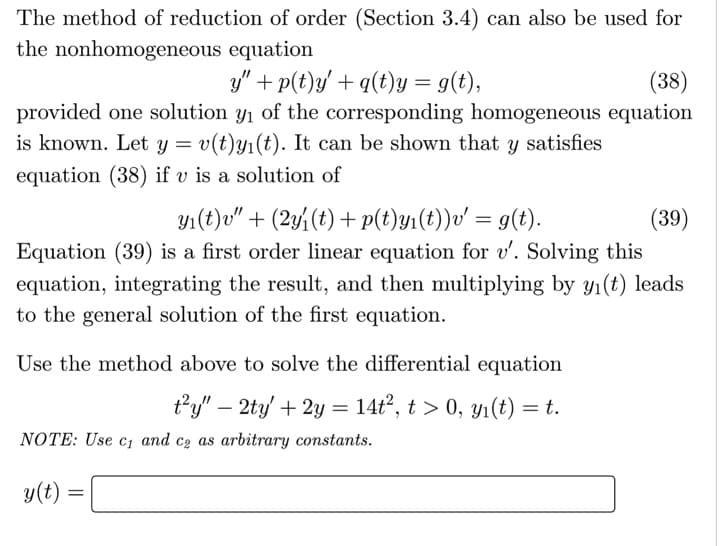The method of reduction of order (Section 3.4) can also be used for the nonhomogeneous equation y/" + p(t)y' + q(t)y = g(t), provided one solution y1 of the corresponding homogeneous equation is known. Let y = v(t)y1(t). It can be shown that y satisfies (38) equation (38) if v is a solution of y1(t)u" + (2y (t) + p(t)y1(t))v' = g(t). Equation (39) is a first order linear equation for v'. Solving this equation, integrating the result, and then multiplying by y1(t) leads (39) to the general solution of the first equation. Use the method above to solve the differential equation ty" – 2ty + 2y = 14t², t > 0, y1(t) = t. - NOTE: Use c; and cz as arbitrary constants. y(t) :
The method of reduction of order (Section 3.4) can also be used for the nonhomogeneous equation y/" + p(t)y' + q(t)y = g(t), provided one solution y1 of the corresponding homogeneous equation is known. Let y = v(t)y1(t). It can be shown that y satisfies (38) equation (38) if v is a solution of y1(t)u" + (2y (t) + p(t)y1(t))v' = g(t). Equation (39) is a first order linear equation for v'. Solving this equation, integrating the result, and then multiplying by y1(t) leads (39) to the general solution of the first equation. Use the method above to solve the differential equation ty" – 2ty + 2y = 14t², t > 0, y1(t) = t. - NOTE: Use c; and cz as arbitrary constants. y(t) :
Advanced Engineering Mathematics
10th Edition
ISBN:9780470458365
Author:Erwin Kreyszig
Publisher:Erwin Kreyszig
Chapter2: Second-order Linear Odes
Section: Chapter Questions
Problem 1RQ
Related questions
Question
100%

Transcribed Image Text:The method of reduction of order (Section 3.4) can also be used for
the nonhomogeneous equation
y" + p(t)y/ + q(t)y = g(t),
(38)
provided one solution y1 of the corresponding homogeneous equation
is known. Let y = v(t)y1(t). It can be shown that y satisfies
equation (38) if v is a solution of
y1(t)v" + (2y%(t) + p(t)y1(t))v' = g(t).
Equation (39) is a first order linear equation for v'. Solving this
equation, integrating the result, and then multiplying by y1(t) leads
(39)
to the general solution of the first equation.
Use the method above to solve the differential equation
ty" – 2ty + 2y = 14t², t > 0, yı(t) = t.
-
NOTE: Use c; and co as arbitrary constants.
y(t) :
Expert Solution
This question has been solved!
Explore an expertly crafted, step-by-step solution for a thorough understanding of key concepts.
Step by step
Solved in 2 steps with 2 images

Recommended textbooks for you

Advanced Engineering Mathematics
Advanced Math
ISBN:
9780470458365
Author:
Erwin Kreyszig
Publisher:
Wiley, John & Sons, Incorporated

Numerical Methods for Engineers
Advanced Math
ISBN:
9780073397924
Author:
Steven C. Chapra Dr., Raymond P. Canale
Publisher:
McGraw-Hill Education

Introductory Mathematics for Engineering Applicat…
Advanced Math
ISBN:
9781118141809
Author:
Nathan Klingbeil
Publisher:
WILEY

Advanced Engineering Mathematics
Advanced Math
ISBN:
9780470458365
Author:
Erwin Kreyszig
Publisher:
Wiley, John & Sons, Incorporated

Numerical Methods for Engineers
Advanced Math
ISBN:
9780073397924
Author:
Steven C. Chapra Dr., Raymond P. Canale
Publisher:
McGraw-Hill Education

Introductory Mathematics for Engineering Applicat…
Advanced Math
ISBN:
9781118141809
Author:
Nathan Klingbeil
Publisher:
WILEY

Mathematics For Machine Technology
Advanced Math
ISBN:
9781337798310
Author:
Peterson, John.
Publisher:
Cengage Learning,

